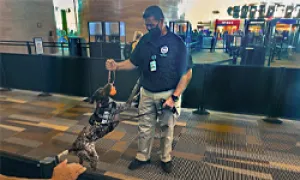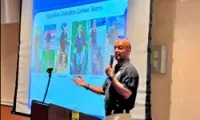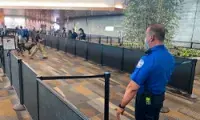
We all know not to disturb an on-duty canine, especially when the dog is working at the airport.
TSA’s canine teams constantly train, keeping their skills sharp to best protect the traveling public from possible threats. Their abilities are truly fined tuned when they work with decoys to detect explosive odors on people. But finding enough people to serve as decoys at airports can be a challenge for TSA.
Tampa International Airport’s (TPA) canine unit is partnering with the local community to help fill this critical personnel training gap. TPA’s connection with the Pinellas County Sheriff’s Citizens Association offers TSA an outlet for the much-needed volunteers. This collaboration improves TPA’s canine unit security readiness while involving the local community.
The unique partnership began in 2018 when Supervisory Transportation Security Specialist-Canine (STSS-C) Reggie Ross attended the Citizens Association monthly meeting. The association is a group of local volunteers interested in learning more about law enforcement.
Ross has worked for TSA since its inception and accepted TPA’s first permanent STSS-C position in 2017. The following year, TSA’s National Explosives Detection Canine Team Program issued a notice encouraging canine units to recruit local, external volunteers for their training.
Ross began creating a recruitment tactics plan to attract outside volunteers, and his team first sought participants from the TPA United Service Organizations workforce and several local colleges. These recruitment efforts barely met the training requirements, but Ross’ team soon found their niche network.
While attending a local job fair in Pinellas County, Ross and Canine Handler April Dwight parked next to a sheriff’s car. Dwight sparked a friendly conversation with members of the Sheriff’s Office Public Relations Bureau, which led to a speaking invitation at the office’s first fall meeting of the Citizens Association.
TPA’s canine team attended the meeting and a lasting connection was created.
Ross highlighted the invaluable relationship between TPA and the community. “The Pinellas Sheriff’s Office Citizens Association quickly became one of the unit’s primary source of local, external volunteers,” he said.
Ross emphasized, “The group’s willingness to routinely volunteer has helped train our canines.”
The association is an active partner for TPA, constantly relaying information to its members about upcoming volunteer opportunities.
“Through the years, several members of the association have included reminders in the group’s monthly email memos about the importance of supporting our canine program,” Ross said. “The positive, welcoming interactions with the volunteers pay dividends when maintaining a great working relationship with our local community members.”
Four years later, this symbiotic relationship remains strong. It’s a win-win for both groups. TPA’s canine unit educates the community on national security efforts, and in return, the team gains connections for training exercises.
For other airports looking to create similar community relationships, Ross stressed the importance of building bonds with the local community and understanding the value-added nature of the relationship. Recently, Ross spoke at the Citizens Association monthly meeting, sharing with more than 60 community members TSA’s mission and efforts to safeguard transportation systems.
His presentation focused on TSA’s canine program and why volunteers are so important for the program’s effectiveness. The talk received high praise and provided members a chance to ask questions and have deeper discussions on security topics, including the latest technologies used at airports. After the event, many new volunteers were excited to sign up for future canine exercises.
The Citizens Association is one of the TPA canine unit’s major resources for the role player program. It’s one of the many successful examples of how TSA canine teams can collaborate with the community and make aviation security everyone’s priority.
TSA TPA’s partnerships with the community are still growing, and Ross is already planning future opportunities to network with local organizations.
“TSA canine units should look for opportunities in their areas to recruit local volunteers for decoy assistance,” he said. “Our canine team is planning an event with the Tampa International Airport Police Department and their new Citizens Academy group. We hope to build another successful relationship with them and get a few volunteers.”
By Kimberlyn Pepe, Strategic Communications and Public Affairs


